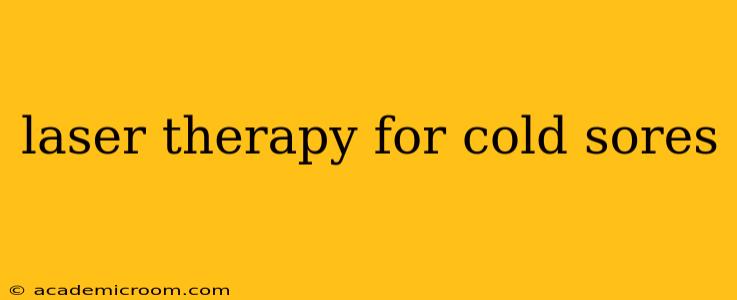Cold sores, also known as fever blisters or oral herpes, are a common viral infection caused by the herpes simplex virus (HSV). While typically resolving on their own within a week or two, their unsightly appearance and discomfort often prompt individuals to seek faster relief. Laser therapy has emerged as a potential treatment option, offering a faster healing time compared to traditional methods. This comprehensive guide delves into the efficacy, process, and considerations of laser therapy for cold sores.
What is Laser Therapy for Cold Sores?
Laser therapy for cold sores utilizes specific wavelengths of light energy to target the affected area. The precise mechanism varies depending on the type of laser used, but generally, the laser energy stimulates cellular regeneration, reduces inflammation, and inhibits viral replication. This approach aims to shorten the duration of the cold sore outbreak, reduce pain and discomfort, and potentially minimize scarring.
How Effective is Laser Therapy for Cold Sores?
The effectiveness of laser therapy for cold sores is still under investigation, and more large-scale studies are needed to definitively confirm its benefits. However, existing research suggests that laser therapy can significantly reduce the healing time and alleviate symptoms. The results may vary depending on factors such as the severity of the outbreak, the type of laser used, and the individual's immune response. It's crucial to consult with a healthcare professional to discuss the potential benefits and risks specific to your situation.
Does Laser Therapy Completely Cure Cold Sores?
No, laser therapy does not cure the underlying herpes simplex virus (HSV). The virus remains dormant in the body, and future outbreaks are possible. However, laser therapy can effectively treat individual outbreaks, reducing their duration and severity.
What are the Different Types of Lasers Used for Cold Sore Treatment?
Several types of lasers have shown promise in treating cold sores, including low-level laser therapy (LLLT) and pulsed dye lasers. Each type uses different wavelengths and mechanisms of action. The choice of laser depends on various factors and is determined by the healthcare provider.
Is Laser Therapy Painful?
Most patients report minimal discomfort during laser therapy for cold sores. The procedure is typically quick, and any discomfort is usually described as a mild tingling or warmth. A topical anesthetic may be used to further minimize any potential discomfort.
How Long Does it Take to See Results from Laser Therapy for Cold Sores?
The healing time varies depending on several factors. However, many patients report a noticeable reduction in symptoms, such as pain, swelling, and blister size, within a few days of treatment. Complete healing is usually achieved within a shorter timeframe compared to natural healing without intervention.
What are the Side Effects of Laser Therapy for Cold Sores?
Laser therapy for cold sores is generally well-tolerated, and serious side effects are rare. However, mild side effects such as temporary redness, swelling, or slight discomfort at the treatment site are possible. These side effects usually resolve quickly.
How Much Does Laser Therapy for Cold Sores Cost?
The cost of laser therapy for cold sores can vary depending on several factors, including the location, the number of treatments needed, and the type of laser used. It's best to contact your healthcare provider or the clinic directly to get a precise cost estimate for your specific case.
How Does Laser Therapy Compare to Other Cold Sore Treatments?
Laser therapy offers a potentially faster healing time compared to traditional treatments like antiviral medications or over-the-counter remedies. However, the decision to use laser therapy depends on individual preferences, the severity of the outbreak, and cost considerations. A healthcare professional can help you weigh the pros and cons of various treatment options.
This information is intended for general knowledge and informational purposes only, and does not constitute medical advice. It is essential to consult with a qualified healthcare professional for any health concerns or before making any decisions related to your health or treatment. They can properly diagnose your condition and recommend the most appropriate course of action based on your individual needs.
